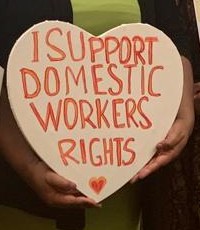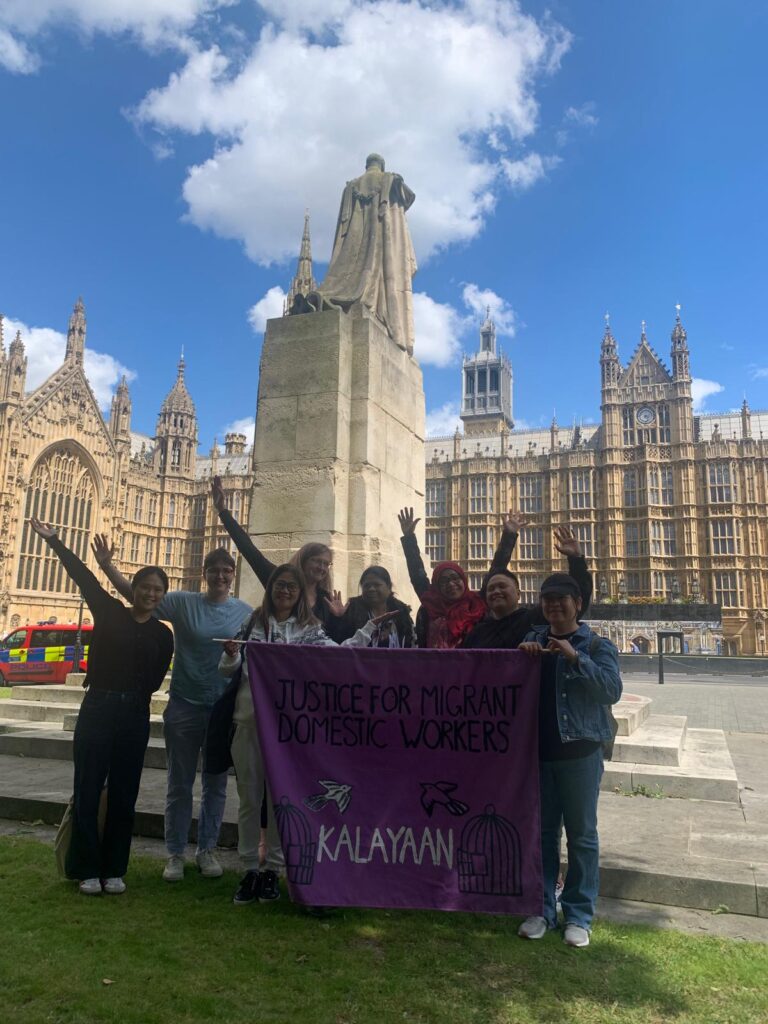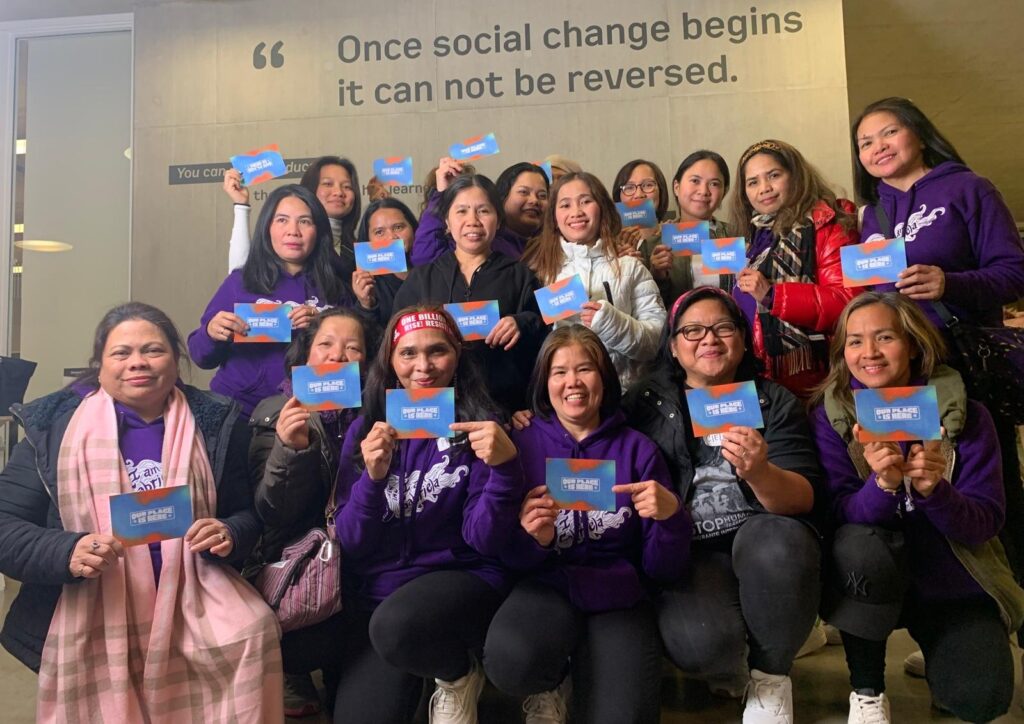BY AVRIL SHARP

Everyone should feel safe in their workplaces. That must be a universal right for all, no matter who you are, or where you come from. But one particular group of migrant workers in the UK continues to face an impossible choice should they find themselves working for an abusive employer: leave and risk destitution, or stay and endure further abuse? Ahead of Anti-Slavery Day on 18 October, Avril Sharp, Policy Officer for Kalayaan, renews calls for long overdue changes to fix the broken Overseas Domestic Worker visa, to ensure all domestic workers can safely leave abusive employment.
Migrant domestic workers are an especially vulnerable group. Their work takes place behind closed doors and away from regulatory oversight. These workers are often without knowledge of their legal rights or where they may access support and assistance in the UK. The power balance in favour of employers cannot be overstated. Many workers that find their way to Kalayaan after fleeing abuse do not have possession of their passport containing their visa, and do not know when their visa expires. The only way to confirm this is a disclosure request to the Home Office for a complete copy of their personal records. Whilst they wait for a response, workers find themselves in a legal quandary, not knowing if they have a valid visa and are able to continue working lawfully.
Evolution of the Overseas Domestic Worker visa
Since 2012, successive UK Governments have repeatedly acknowledged the vulnerabilities faced by migrant domestic workers. However, their concern has been restricted to after-the-event responses that focus measures and resources to rescue workers who have experienced extreme abuse, rather than addressing the ways in which the legislative and policy framework facilitates abuse of migrant domestic workers and excludes them from certain fundamental protections as workers in their own right. The result has meant workers have had to demonstrate their treatment has deteriorated to the point of slavery before they are able to seek redress. This reactive approach does nothing to prevent abuse escalating, places an evidential burden on workers and obfuscates the role the state plays in handing more control to employers.
The previous visa regime, in place from 1998 to 2012, permitted workers the right to change employers, registering any such change with the Home Office, and the right to renew their visa if they could demonstrate their labour as a domestic worker was still required. Such safeguards were instrumental in preventing abuse from escalating, and enabled workers to access reporting mechanisms to hold employers accountable whilst in the safety of alternative employment. Workers also had the right to apply to have their spouses, partners and minor children join them in the UK and, after five years of continuous employment, the right to apply to put down permanent roots and settle in the UK. The 2009 Home Affairs Select Committee Inquiry into Trafficking found that this visa regime and the protection it offered to workers was the single most important issue in preventing the forced labour and trafficking of such workers.
These same rights were stripped away from workers in April 2012 when the then Government made drastic changes to the terms of the Overseas Domestic Worker. Despite vehement and widespread opposition to the changes, the then Home Secretary Theresa May stated in the House of Commons that the Government was restoring the Overseas Domestic Worker routes to their original purpose in allowing ‘visitors and diplomats to be accompanied by their domestic staff – not to provide permanent access to the UK for unskilled workers’. Characterising domestic work as low skilled and therefore unworthy of the rights enjoyed by migrants in other occupations considered high skill, devalues the important and crucial contribution made by this workforce to families and communities across the UK. It also fails to recognise that the skills migrant domestic workers provide could respond to post-Brexit labour shortages in the UK, including the social care sector.
Stripping rights for this workforce did not reduce demand for domestic workers’ labour but did produce a significant increase in rates of worker exploitation. Following Parliamentary scrutiny and the findings of a Government-commissioned independent review, some limited changes were made to the visa in April 2016 when the Government permitted workers to change employers to avoid them being trapped working for abusive employers. However, the review found that workers need to be afforded sufficient time to be able to safely exercise their right to change employer, as the underlying rationale for changing employers is to give workers a route out of abusive employment, of which safe re-employment is an essential part. It therefore recommended that workers should have the right to renew their visa, subject to ongoing employment. As a result of not implementing this recommendation, since April 2016, workers have had the right to change employers, but only whilst their six-month visa remains valid. There has also been no requirement for workers to notify the Home Office when changing employer, which the Government has claimed can stand as an administrative burden.
It is, generally, outside the control of workers as to when they arrive in the UK, as this is dictated by their employer, meaning that workers may arrive in the UK with less than, sometimes significantly less than, six months on their visa. This makes them highly undesirable to new employers looking to hire someone to join their household. The absence of the right to renew their visa means that workers risk destitution if they change jobs and/or challenge their employer or conditions of employment. Many are forced to remain with abusive employers rather than lose their livelihood, accommodation and permission to stay in the UK. Those that flee are at risk of destitution and further harm, including the risk of being trafficked or forced into other situations of labour exploitation. The current situation means that workers cannot hold abusive employers accountable and are trapped in cycles of workplace abuse.
Government responses to date
When workers and supporting organisations have raised this exploitation trap with officials, the response has been that they are aware of the special vulnerability that migrant domestic workers have, and that there is the National Referral Mechanism (NRM) to provide support and assistance. This policy position is problematic. First, it does not prevent work conditions from deteriorating and withholds protections until the harm has taken place. Secondly, not all abuse experienced by migrant domestic workers falls within the legal definition of trafficking or slavery. Under international law, human trafficking requires an act, means and purpose whereas modern slavery only requires means and purpose only. These cases will not qualify for a referral, leaving workers at high risk of further harm from those looking to exploit their insecure status. Some of these workers have been forced into exploitative work due to there being no other options for their survival.
Other Government responses have included that the length of the domestic worker visa aligns with that of the employer and reflects the short-term nature of their time in the UK. The purpose of the visa route for domestic workers is not in dispute. However, by denying workers the options to withdraw their labour for any reason, including to leave exploitation, the visa structure exacerbates a significant power imbalance, creates multiple dependencies and significant risks of exploitation. When workers experience abuse or threats of abuse whilst in the UK, they are denied an effective and accessible escape route.
The Government has also claimed that workers are able to change their employer without notifying the Home Office, to ensure that those who need to escape unsuitable conditions can do so quickly and without additional administration. This is at odds with those who were issued a visa prior to April 2012 and are still required to notify the Home Office. The result of this is that, since April 2012, not only are workers not protected or safeguarded from abuse, but the Government has denied themselves crucial data which would help inform their understanding of the reasons why workers change employer. Interrogation of NRM cases and outcomes, and the use of entry and exit data, cannot and should not serve as an adequate substitute for this given their respective limitations.
The evidence base
On International Domestic Workers Day in 2024, Kalayaan produced a report called 12 Years of Modern Slavery: the smokescreen used to deflect state accountability for migrant domestic workers. This has an overview of the history of the domestic worker visa regime and sets out in full the reasons why previous Government administrations have rejected calls made by workers to have rights at work that would keep them safe. It also contains evidence of more than 2,000 workers and their reported experiences over a 16-year period, the largest data picture that exists in the UK. This data unequivocally demonstrates that reported abuse has increased exponentially since 2012, with changes in 2016 making little difference.
Of 2,080 workers registering at Kalayaan between April 2008 and April 2024:
- 14% of workers issued a visa prior to 6 April 2012 presented with indicators of trafficking. This rose to 40% of the workers issued a visa after 6 April 2012 and 41% of the workers issued a visa after 6 April 2016.
- 47% of workers issued a visa prior to 6 April 2012 did not have access to their passport in the UK. This rose to 73% of workers issued a visa after 6 April 2012 and 6 April 2016 respectively.
- 38% of workers issued a visa prior to 6 April 2012 did not have their own bedroom or private space. This rose to 64% of workers issued a visa after 6 April 2012 and 53% of workers issued a visa after 6 April 2016.
- 24% of workers issued a visa prior to 6 April 2012 were not paid regularly. This rose to 39% of workers issued a visa after 6 April 2012 and 31% of workers issued a visa after 6 April 2016.
In all types of reported abuse collated by Kalayaan, reports are higher when the worker was issued a visa after 6 April 2012, when the tied visa regime took effect, with levels remaining consistently high following changes to the visa made in April 2016.
The current battleground
Given the ongoing dire situation for this workforce, an amendment to the Border Security, Asylum and Immigration Bill was tabled at committee stage by Baroness Hamwee, and supported by Baroness Lister and Baroness O’Grady. As Baroness Hamwee explained to the House of Lords, ‘Amendment 153 is specifically about migrant domestic workers and seeks to restore the protections they had until 2012. I hope the Home Office will recognise that this amendment is the humane and appropriate response to the appalling situation in which some—I stress some—domestic workers find themselves, at the hands of extreme abuse by their employers.’ A number of other peers spoke in support of the amendment during the debates at Committee Stage. Among them was Baroness Bennett who said, ‘13 years down the track, all their predictions [Kalayaan, the Voice of Domestic Workers, campaign groups and workers themselves] have come true. It is absolutely indefensible’. In response, the Government reiterated its commitment to reconsider how this route operates and asked for patience, despite the evidence being resoundingly clear.
If the Government is serious in their stated ambitions to prevent the importation of exploitative practices and combat trafficking of this workforce, it must consider the available evidence which tells us that reported abuse is significantly higher when workers do not have rights to challenge abusive employers.
The original Overseas Domestic Worker visa and the protections it offered to workers meant that workers could challenge abuse when it arose and, if necessary, withdraw their labour, find alternative employment and consider their options in taking action against their former employers. The safety of workers must be the paramount consideration if they are to feel able to pursue action and end cycles of workplace abuse. Kalayaan looks forward to working with sector partners as the work to fix the broken domestic worker visa continues.
Avril Sharp is Policy Officer for Kalayaan, a London based charity which works to provide practical advice and support to, as well as campaign with and for, the rights of migrant domestic workers in the UK. As well as being an IAA-regulated adviser, Avril leads on Kalayaan’s policy and campaign work to better improve the conditions and protections of domestic workers in the UK.


Migrant workers campaigning for improvements to their rights.
ILPA invites members and other leading experts to contribute articles to its monthly blog. The views expressed in all blog posts are the authors’ own and are not necessarily those of ILPA.
Related Reading
- Document Date
- Friday October 17, 2025
